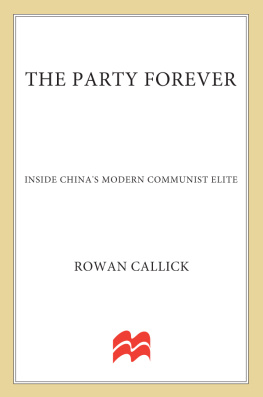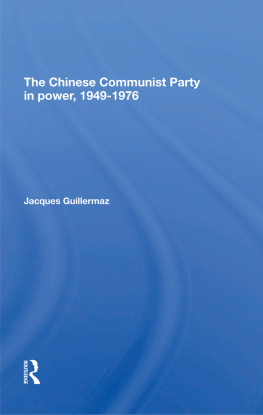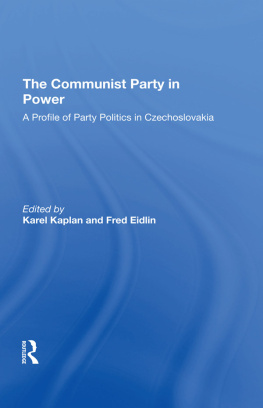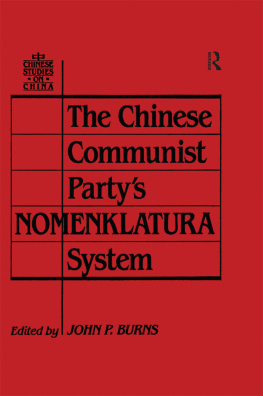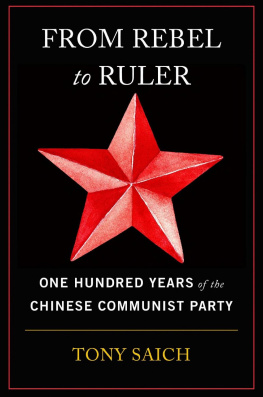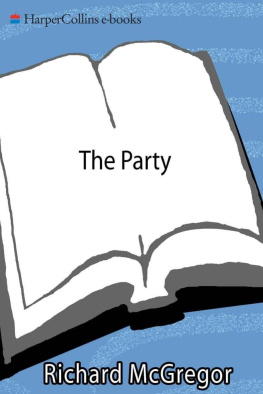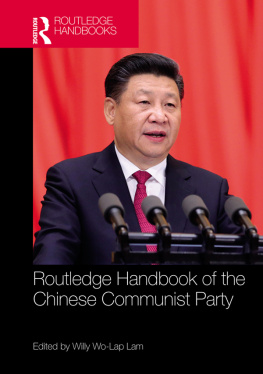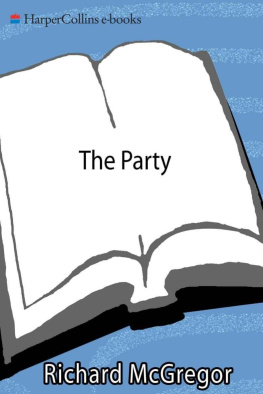THE PARTY FOREVER
INSIDE CHINAS MODERN COMMUNIST ELITE
ROWAN CALLICK

The author and publisher have provided this e-book to you for your personal use only. You may not make this e-book publicly available in any way. Copyright infringement is against the law. If you believe the copy of this e-book you are reading infringes on the authors copyright, please notify the publisher at: us.macmillanusa.com/piracy.
This book is dedicated to Jan, Rose, Christian and Paul, and to Enlang.
CONTENTS
THE PARTY FOREVER
Copyright Rowan Callick, 2013.
All rights reserved.
For information, address St. Martins Press, 175 Fifth Avenue, New York, N.Y. 10010.
First published in 2013 by Black Inc., an imprint of Schwartz Media Pty Ltd.
First Published in the United States in 2013 by
PALGRAVE MACMILLANa division of
St. Martins Press LLC,
175 Fifth Avenue, New York, NY 10010.
ISBN 9781137278852
Our eBooks may be purchased in bulk for promotional, educational, or business use. Please contact the Macmillan Corporate and Premium Sales Department at 1-800-221-7945, ext. 5442, or by e-mail at .
Library of Congress Cataloging-in-Publication Data
Callick, Rowan.
The party forever : inside Chinas modern communist elite / Rowan Callick.
pages cm
Includes bibliographical references and index.
ISBN 9781137278852
1. Zhongguo gong chan dang. 2. Political partiesChinaHistory21st century. 3. ChinaPolitics and government21st century. I. Title.
JQ1519.A5.C18743 2013
324.251075dc23 2013004222
A catalogue record of the book is available from the British Library.
Design by Newgen Knowledge Works, Ltd., Chennai, India.
10 9 8 7 6 5 4 3 2 1
Printed in the United States of America.
INTRODUCTION
A meticulously choreographed business banquettensions simmering beneath the countless courteous toastswas under way in a private room off the marble-clad main dining room at the grand Beijing Hotel. The hotel, immediately to the east of Tiananmen Square, was built in 1900 as China stood on the verge of a century of wars and tyranny. It is magnificently located but has seen better times. Businesspeople prefer to stay in the citys myriad twenty-first-century hotels. They dont need to be near the tourist sites or the grand buildings of state.
After the usual exchange of name-cards, the head of the small foreign business delegation naturally paid especially close attention to the executive chairman of the state-owned corporation with which he hoped to clinch a dealcommunicating through an interpreter employed by the Chinese hostsand to the English-speaking general manager.
The foreign business leader did not pay any attention to another figure at the table, a quiet and earnest-looking man in his early fortiesthe only person who neither wore a tie nor offered a name-card, and who appeared somewhat distracted.
Half way through the banquet, which had become increasingly relaxed and rambunctious as the toasts showed no sign of slowing, this puzzling outsider suddenly spoke. In refined, Oxbridge-accented English, he intervened to make a robust point. The other Chinese fell silent, waiting for him to finish. The foreign chief executive realized he had lost the first round.
The new speaker, it dawned on him, was the person who would make any meaningful decision about the deal on the table. It would take considerable diplomatic acumen to recover from this initial faux pas, which was born of a presumption that anyone without a name-card must have no real standing, and almost certainly spoke no English.
The mystery man was a representative of the ruling Chinese Communist Party (CCP). It was he who would make the call whether to pursue the proposed foreign connection. They were eating at the Beijing Hotel in part because it is state-owned, and in part because party members sometimes like to put foreign concepts of fashionability in their place. Party officials will go some way toward the Western way of doing business, but never all the way. No senior leader, for instance, will ever be seen playing golf. Anywhere. Even miniature golf.
Many foreigners, including businesspeople, misread China. This is not a new phenomenon. Others have misread the country in the past, for instance during the Cultural Revolution when visitors were ushered through Chinese versions of Potemkin villagesthose Soviet-era model communities constructed specially to impress foreign visitors. They returned to their countries singing the praises of the new, altruistic society that Mao Zedong had built, with its barefoot doctors and warm-hearted, open-minded intellectuals learning from peasants. They failed to see, or to uncover, the truth about what was to become Chinas lost decade, disfigured by anarchy and cruelty and costing untold numbers of lives every week.
Todays most common misreading is to praise Chinas economic development while claiming such material success as a victory for capitalism or for Western technology. Sometimes, its true, the role of the party is subtly concealed, as at the business banquet. But even when it is emblazoned in public, many outsiders dont want to believe what they are seeing. Entering the Forbidden City from Tiananmen Square, visitors may gaze up at the massive portrait of Mao that hangs over the outer gate but discount it as a quaint nod to a communist past, as though Mao were an emperor from a long-ago dynasty. What, they wonder, can that era of bicycles and safari suits have to do with the futuristic skyline of twenty-first-century Beijing?
But perceptions can of course be misleading. They can even be designed to that effect. Trompe loeil was not unique to the French gardeners who devised the term. Virtually every Chinese garden features the clever device called zhang jingblocked view or screened sceneryby which, even in a comparatively confined space, the stroller keeps encountering fresh, formerly hidden vistas. A visitor to Shanghais famous 450-year-old Yu Yuan Garden, for instance, following the mazy paths between countless goldfish ponds, peony beds, and airy pavilions, readily believes that it is far bigger than its modest five acres.
So it goes with Chinas biggest landscape, its national story. You catch a glimpseperhaps beguiling, perhaps rocky, and to the Western eye alienatingof where China seems to be heading, and then the outlook swiftly changes, you lose focus, a fresh view emerges, and truths either suddenly appear or are cunningly concealed.
No wonder many fail to take todays China at face value. They prefer to disregard the obvious because it does not conform to their belief that modernity automatically displaces communism, as a rock thrown into a pool displaces water.
In fact, if your eyes are open, almost everywhere you look in the twenty-first-century Chinese landscapesometimes subtly concealed, sometimes in-your-facethe ruling party plays a dominant role. Chinas communist leaders are seenand see themselvesas a chosen people entrusted with authority, through the means of a chosen state, to rule over a chosen civilization that is entering a golden age of prosperity, known in China as a shengshi.
As Chinas own fortunes have soared, so have those of the Communist Partywhich has now become the most powerful organization in the world, even overtaking the Vatican, whose authority, focused by Pope John Paul II, helped destroy the Soviet Empire in the 1980s.
Yet the CCPs modus operandi, the way it runs the worlds most populous country and increasingly drives the world economy, remains extraordinarily little understood, even by people who visit China frequently. This suits the partys leaders, who are no longer larger-than-life, charismatic figures like Mao or Deng Xiaoping, but committee-men who seek consensus and weed out those who are awkward or contrary. Hu Jintao, Chinas top leader for a decade until the end of 2012, remained an enigmatic figure about whom little is known even today. Not much more is known about his successor, Xi Jinping, despite his more open face and more ready grin; his wife, the singer and TV variety star Peng Liyuan, was, until his elevation to the top job, considerably more famous in China than he is.
Next page
